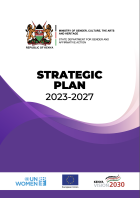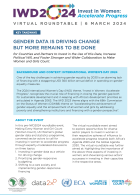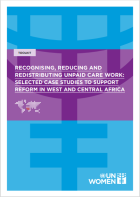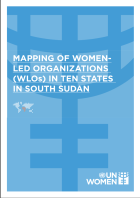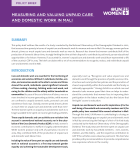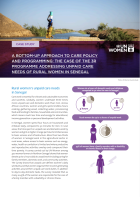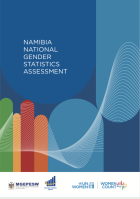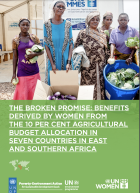1 - 16 of 16 Results
Date:
The Publication is a detailed strategic plan for the period 2023-2-27. It highlights previous achievements, lessons and emerging issues that define the policy direction of the gender sector achieving a society free from gender discrimination and violence
Date:
Prioritizing Women's Peace and Security to achieve Gender Equality.
Date:
This publication aims to identify the existing gender gaps in legal frameworks and policies to enable the integration of gender issues to increase the leadership roles of women and women with disabilities in local decision-making and ensure that they are equal beneficiaries of development interventions.
Date:
In this pre-IWD2024 roundtable event, Making Every Woman and Girl Count (Women Count), UN Women’s global gender data and statistics programme, convened sector actors to call for investing in women to accelerate progress through moderated discussions on: investing in gender data as a vehicle for driving change; prioritizing gender-responsive budgeting; shifting to a care society and implementing gender-responsive financing. The UN Economic Commission for Africa and the African Development Bank (AfDB) provided continental perspectives while global gender data alliance Data 2X provided a global view of the status of investment in gender data and its importance for gender equality and women's empowerment (GEWE).
Date:
This advocacy brief provides an overview of the trends in terms of Gender Based Violence (GBV) as a human rights violation in the southern Africa sub-region.
Date:
Unpaid care work by women is one of the most important constraints they face in running their businesses or advancing in their careers. This toolkit presents a compilation of case studies that have been selected to support governments and civil society in dialogue around the implications of unpaid care work on women’s lives and countries development outcomes and for positioning (unpaid) care reform in a more central role in policies in the region.
Date:
As gaps remain in efforts to stem the tide of global economic crises, having fiscal policies in place to safeguard spending for women is essential. Gender Responsive Budgeting (GRB) can ensure a gender-equitable allocation of resources and expenditure tracking to promote gender equality. This briefing note provides information on the foundation established to determine entry points for this work, key partnerships, and plans to advance systemic financing for gender equality in the country.
Date:
This policy brief outlines the results of a study conducted by the National Observatory of the Demographic Dividend in 2022, that assesses time poverty in terms of unpaid care and domestic work in Mali. Research showed that women contribute 80% of the
production of domestic labour time, strongly limiting the time at their disposal for paid work and educational opportunities. If accounted for, women’s unpaid care would represent 17.6% of the country’s GDP (2019).
Date:
The Report documents our work with communities and stakeholders to advance Gender Equality in Zimbabwe, the challenges, interventions and results achieved
Date:
In Senegal, UN Women's 3R programme has focused on: research to identify unpaid care needs of women in rural areas; integrating unpaid care solutions in local investment plans; adapting and scaling up health insurance solutions through policy dialogue with the National Health Insurance Agency and the private sector; and using these experiences to facilitate evidence-based care policy dialogues. This case study discusses the program's experience and results.
Date:
This edition of our quarterly publication, aimed at keeping our esteemed readers abreast with the endeavors of UN Women Uganda, encompasses the period of October through December 2022. Within these pages, we have meticulously curated a selection of activities undertaken by our organization, as well as providing a platform for the voices of those whom we have had the privilege of serving, to be heard. We trust that the contents of this newsletter will prove to be both enlightening and informative. Enjoy the read!
Date:
The identification of gender data and capacity gaps in the national statistics system is one of the first steps that has to be executed when working towards the increased production and use of gender statistics in a country. This report summarizes the findings of such an assessment done in Nambia during 2022. The findings will be used to inform planning, resource allocation and programming towards the improvement of gender statistics in the country.
Date:
This brief gives an overview of the Gender Statistics programmes across East and Southern Africa.
Date:
The publication aims to provide information that helps prepare the youth for an inclusive, environment sensitive, and resilient approach to productive livelihoods.
Date:
The publication aims to serve as an advocacy report on gender issues and contributing to efforts in strengthening regional norms and policies on women and youth’s economic empowerment.
Date:
The UN Women WCARO annual report aims to share information about the regional office's activities on women empowerment and gender equality in 2020. The said year has been a particularly difficult year around the world with the COVID-19 pandemic. In West and Central Africa (WCA), women and girls were particularly vulnerable to the crisis. To counter these burdens and build medium and long- term recovery measures, the UN Women WCA Regional Office successfully provided multi-faceted assistance...

